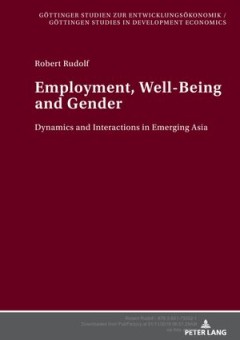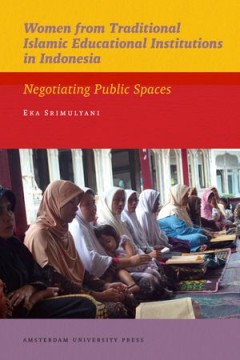Filter by

Open Borders, Unlocked Cultures: Romanian Roma Migrants in Western Europe
The book examines some of the dilemmas surrounding Europe’s open borders, migrations, and identities through the prism of the Roma – Europe’s most dispersed and socially marginalised population. The volume challenges some of the myths surrounding the Roma as a ‘problem population’, and places the focus instead on the context of European policy and identity debates. It comes to the con…
- Edition
- -
- ISBN/ISSN
- 9781315295763
- Collation
- -
- Series Title
- -
- Call Number
- 301 OPE o

New Frontiers in Japanese Studies
Over the last 70 years, Japanese Studies scholarship has gone through several dominant paradigms, from ‘demystifying the Japanese’, to analysis of Japanese economic strength, to discussion of global interest in Japanese popular culture. This book assesses this literature, considering future directions for research into the 2020s and beyond.Shifting the geographical emphasis of Japanese Stud…
- Edition
- -
- ISBN/ISSN
- 9781000054149
- Collation
- -
- Series Title
- -
- Call Number
- 301 NEW n

The New Demagogues: Religion, Masculinity and the Populist Epoch
Focused on the emergence of US President Donald Trump, the United Kingdom’s departure from the European Union, and the recruitment of Islamic State foreign fighters from Western Muslim communities, this book explores the ways in which the decay and corruption of key social institutions has created a vacuum of intellectual and moral guidance for working people and deprived them of hope and an…
- Edition
- -
- ISBN/ISSN
- 9780429775246
- Collation
- -
- Series Title
- -
- Call Number
- 301 ROO n

Neurodiversity Studies: A New Critical Paradigm
Building on work in feminist studies, queer studies and critical race theory, this volume challenges the universality of propositions about human nature, by questioning the boundaries between predominant neurotypes and ‘others’, including dyslexics, autistics and ADHDers. This is the first work of its kind to bring cutting-edge research across disciplines to the concept of neurodiversity. I…
- Edition
- -
- ISBN/ISSN
- 9781000073768
- Collation
- -
- Series Title
- -
- Call Number
- 301 NEU n

Transitions in Segmented Labor Markets
When labor market economists started to work on segmented labor markets, they classified informal employment as a transitory state. At the end of the 20 century, informal employment still persists governments’ attempts to eradicate it and represents a growing labor market segment not only in developing countries but worldwide. It is evident that informal employment will not disappear but has …
- Edition
- -
- ISBN/ISSN
- 9783631531624
- Collation
- -
- Series Title
- -
- Call Number
- 320 WOL t

Poverty, Inequality and Migration in Latin Amerika
The causes and consequences of high inequality in incomes, assets, and many aspects of well-being in Latin America have recently (re-)emerged as a central research and policy issue. However, many open questions remain that will be dealt with in the contributions to this volume. First, the linkages between growth, inequality, and poverty in Latin America need further clarification. More analyses…
- Edition
- -
- ISBN/ISSN
- 9783631573273
- Collation
- -
- Series Title
- -
- Call Number
- 320 POV p

Employment, Well-Being and Gender
This book examines welfare effects of gender-related inequalities in Korean households and labor markets. It uses subjective well-being data to show that reductions of excessive levels of working hours did improve family well-being in the past decade. Moreover, benefits from major life events like marriage can differ greatly by sex if traditional gender roles dominate and women contribute much …
- Edition
- -
- ISBN/ISSN
- 9783631623022
- Collation
- -
- Series Title
- -
- Call Number
- 304.6 RUD e

Cartographies of Differences: Interdisciplinary Perspectives
This volume investigates the process of learning how to live with individual and group differences in the twenty-first century and examines the ambivalences of contemporary cosmopolitanism. Engaging with the concept of ‘critical cartography’, it emphasizes the structural impact of localities on the experiences of those living with difference, while trying to develop an account of the counte…
- Edition
- -
- ISBN/ISSN
- 9783035308044
- Collation
- -
- Series Title
- -
- Call Number
- 301 CAR c

The Work of Authorship
Technological and economic concerns have long been the drivers of debate about copyright. But diverse disciplines in the humanities - including literary studies, aesthetics, film studies, and the philosophy of art - have a great deal to offer if we wish to establish a more nuanced and useful conception of copyright and authorship. This volume brings together scholars from a range of disciplines…
- Edition
- -
- ISBN/ISSN
- 9789048523009
- Collation
- -
- Series Title
- -
- Call Number
- 300 EEC w

Women from Traditional Islamic Educational Institutions in Indonesia
Until currently there have been no specific publications, particularly in English, on women in traditional Islamic educational institutions in Indonesia, known as pesantren, which played a significant role in shaping the gender issues in the Indonesian Muslim community. This informative and insightful book contributes to two booming fields in Indonesian studies: the study of Islam and the study…
- Edition
- -
- ISBN/ISSN
- 9789089644213
- Collation
- -
- Series Title
- -
- Call Number
- 297 SRI w
 Computer Science, Information & General Works
Computer Science, Information & General Works  Philosophy & Psychology
Philosophy & Psychology  Religion
Religion  Social Sciences
Social Sciences  Language
Language  Pure Science
Pure Science  Applied Sciences
Applied Sciences  Art & Recreation
Art & Recreation  Literature
Literature  History & Geography
History & Geography